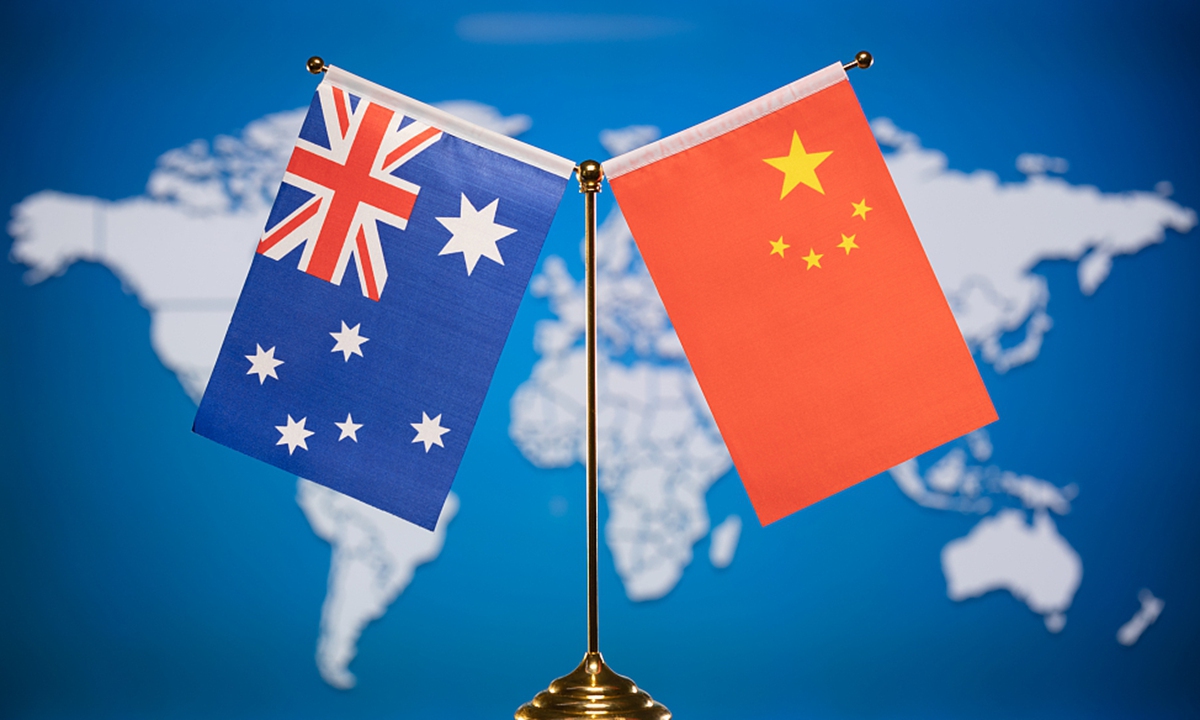
China Australia. Photo: VCG
China and Australia have far more common interests than differences, Chinese State Councilor and Foreign Minister Wang Yi said in a phone call on Tuesday with Australian Foreign Minister Penny Wong at her request. Both sides have stated that they will continue to make efforts to improve and strengthen China-Australia relations.
The talks, coming amid the 50th anniversary of the establishment of diplomatic ties between China and Australia, are crucial in further breaking the ice and letting go of past grudges and creating a positive environment for interactions between the two sides at the upcoming G20 leaders' meeting, experts said, while calling upon Canberra to show more political wisdom and determination to filter out noises from Washington and maintain its own independence in developing ties with China.
The easing and improvement of China-Australia relations serves the fundamental interests of both sides and meets the common expectations of peoples from both countries and the international community, Wang said.
The two sides should continue to adhere to the consensus of the comprehensive strategic partnership, uphold the spirit of mutual respect, seek common ground while shelving differences, and work toward the goal of mutual benefit and win-win results, Wang remarked.
Penny Wong said that the two countries have maintained effective communication and contact recently, and bilateral relations have witnessed positive changes through unremitting efforts. Australia will continue to adhere to the one-China principle and develop more stable and mutually beneficial relations with China on the basis of mutual respect.
A sound China-Australia relationship is not in contradiction with safeguarding respective national interests, and the Australian side has no intention to magnify existing differences, said Wong, adding that Australia is ready to properly handle specific issues in a responsible manner within the framework of China-Australia comprehensive strategic partnership and make continuous efforts to improve and strengthen bilateral relations.
Since the new Albanese government came to power, it has been expected to adopt a more positive attitude toward relations with China, which had been in a stalemate for the past five years, Chen Hong, president of the Chinese Association of Australian Studies, told the Global Times on Tuesday.
Such attempts have been seen in more frequent high-level interactions between both sides this year, including meetings of defense ministers and foreign ministers, which indicate that both China and Australia are willing to change the abnormal status quo and return to the right track as comprehensive strategic partners, observers noted.
It has also created a positive atmosphere for further engagement of both sides at the upcoming multilateral events, namely the East Asia Summit, the G20 Leaders' Summit, and the APEC Summit.
During the Tuesday talk, Wang also stressed that both China and Australia should gradually address each other's legitimate concerns and make positive contributions to address current global challenges.
There are a number of areas for cooperation. China has always imported goods from Australia, such as iron ore, coal, natural gas, agricultural products, seafood and dairy products, and the trade will certainly continue, analysts said.
In addition, the two sides can cooperate in developing green energy. Australia is now trying to get rid of its dependence on fossil fuels and make a transition to solar and wind power. However, Australia itself does not have the production capacity as solar panels are mainly produced in China, so there is a lot of room for cooperation in this field.
The two sides can also join hands in helping Pacific island countries in their fight against climate change, as well as disaster mitigation and relief, analysts said.
However, Australia's recent attempts to ramp up its defense spending, including seeking to acquire nuclear submarines through the AUKUS deal, have shown increasing aggressiveness and echoing the US' anti-China strategy.
In this regard, Chen urged Australia to stop blindly following in the US' footsteps which would only end up hurting itself. "China has always held open arms to Australia and is willing to engage in more cooperation, but we hope Canberra, once misled by so-called ideological differences, can view its relationship with Beijing objectively and pragmatically," he said.
The last time the two foreign ministers met was on the sidelines of the United Nations General Assembly in New York on September 22. Both sides stressed the importance of China-Australia relations, reaffirmed the positioning of the comprehensive strategic partnership between the two countries and agreed to bring bilateral relations back on track at an early date in the spirit of mutual respect.




